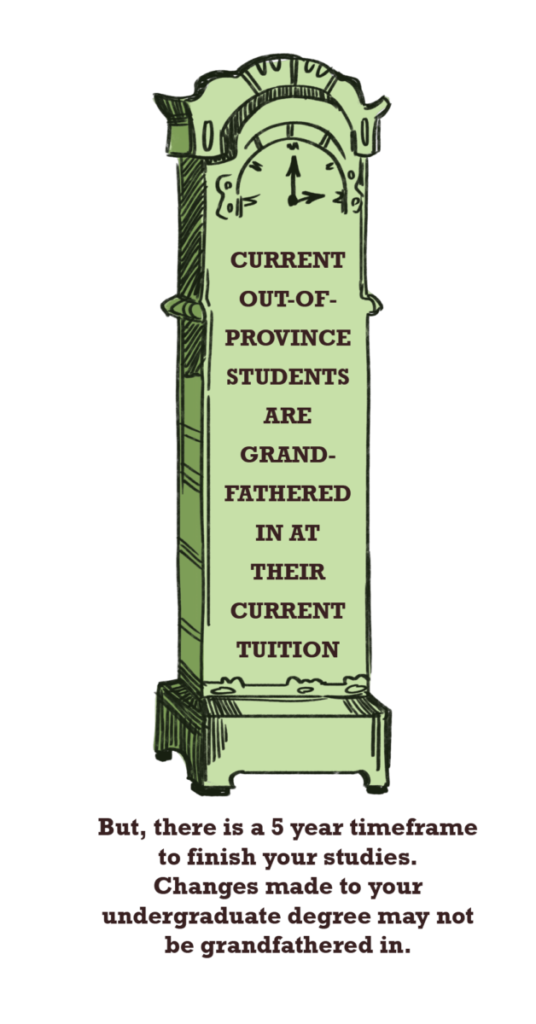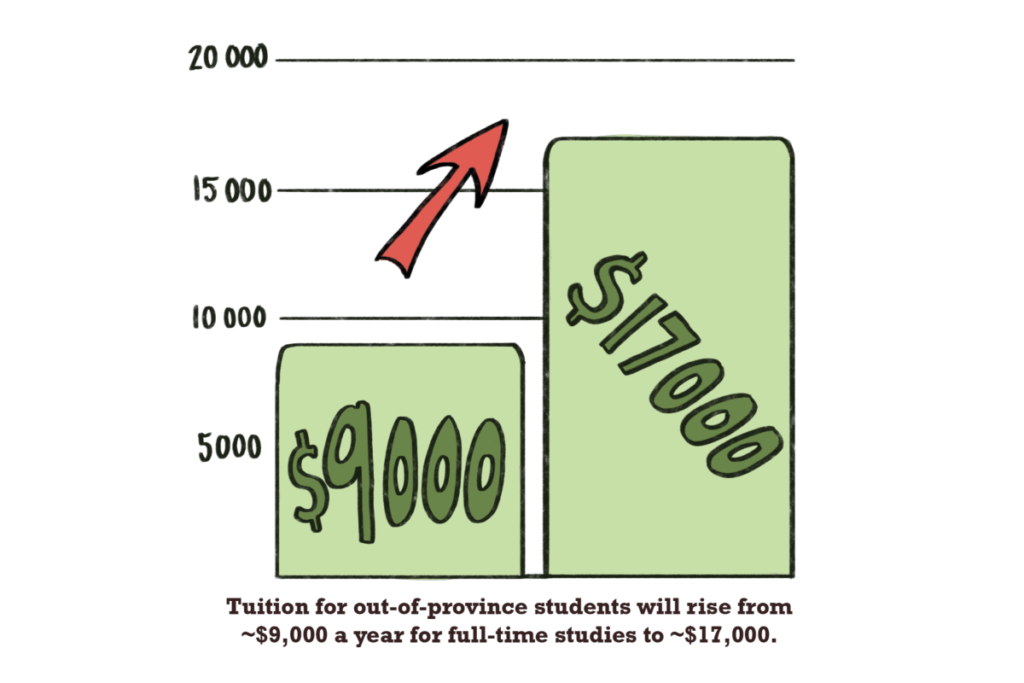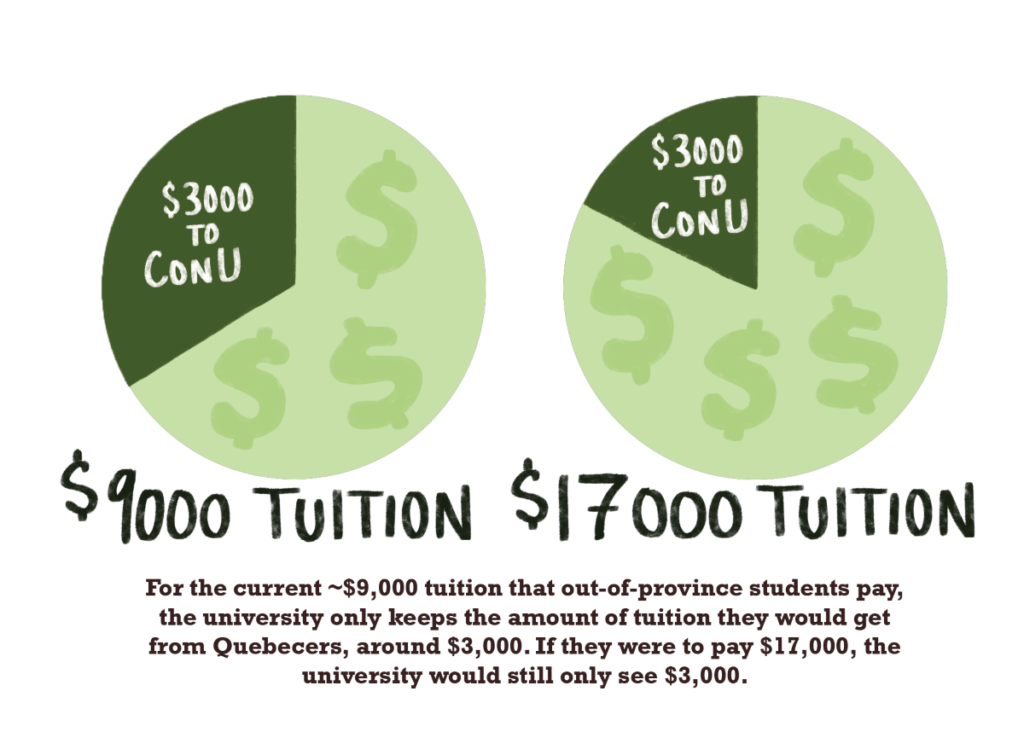English universities struggle to see what their future will be without diversity in registration.
Montreal is the diversity hub of Quebec, and the provincial government’s latest blow to its universities has led to uproar from all sides of the city.
“It feels terrible. Very like… have your cake and eat it too,” said Dyan Solomon, renowned restaurant owner in Montreal and once out-of-province student, on the topic of the tuition increases set by the government of Quebec.
On Oct. 13, the Quebec government implemented measures beginning at the start of the next fall term to “rebalance” the university network in Quebec and protect the French language. To do so, the Quebec government will be increasing tuition for out-of-province students from $9,000 to $17,000 and charging universities $20,000 for every international student. This move would make Quebec universities the most expensive in Canada for out-of-province students.
Students who are currently enrolled in an English university in Quebec will be grandfathered in at their current tuition rate.
“I’ve been paraded around a lot by the Quebec media,” she added. “It’s very charming, the anglophone who learned how to speak French.” Her overall experience with francophone Quebec media has been positive, but she questions why she is being used for tourism in Montreal while supposedly being a threat to the culture.



Solomon hails from Kingston, Ontario. She moved to Montreal to study English literature at McGill. Now, Solomon has gone on to open up three renowned restaurants; Olive & Gourmando, Un Po’ Di Più, and Foxy. She employs over 100 people and is a massive contributor to the culinary culture of Montreal. Her cafe/restaurant Olive & Gourmando was the first business to breathe life back into Montreal’s Old Port. So, being described as a threat to the French language did not sit right with her.
She also spoke about many of her colleagues in the restaurant industry who have come from away and forged a life here in Quebec navigating the difficult life of entrepreneurship here as an Anglophone.
Since the tuition hikes were announced, she has been using her platform as an influential Montrealer on Instagram to share her story as a former out-of-province student. She quickly accumulated a lot of responses from other remarkable Montrealers who have come from away and decided to gouge out a life in Quebec.
Being here during the referendum of 1997, Solomon felt the high expectation of learning French as an out-of-province student in the 90s. “When you came here you had the responsibility to speak French,” she said. “This is what you do–get with the program.”
Students who are currently enrolled in an English university in Quebec will be grandfathered in at their current tuition rate.
In a press conference, Jean François-Roberge, minister of the French language, and Pascale Déry, higher education minister, presented the new tuition framework as a way to promote the French language in Montreal as well as redistribute funds in the under-funded Quebec university system.
When asked if there is too much English being spoken on the streets of Montreal, Jean François-Roberge said: “Of course.” This has sent Quebec’s three English universities, McGill, Concordia and Bishops, into a frenzy, as they account for the largest population of students from outside of Quebec.
In the same press conference Pascale Déry stated that they are looking to “put an end to funding Canadians” by introducing this tarification model. She said that most of these students leave after their studies, and asked why the Quebec tax payer should foot the more than $110 million a year bill for these students. This number has yet to be proven in documents from the government.
Bishops University, with a student population of just 2,500 students, 30 per cent of which are out-of-province and 15 per cent international, will feel the biggest impact of the tuition increase. This new framework threatens to force the closure of the small liberal arts college in the Eastern Townships.
As an out-of-province student from Alberta, Bishops’ student body president Sofia Stacey believes the measure will make out-of-province students feel unwelcome in Quebec. “Students are fearful, stressed, frustrated, but most of all angry, because they feel that they’ve been told whether they won’t be affected or not, that they don’t belong here,” she said and continued by saying that maybe there just isn’t a place for them in Quebec anyways.
Stacey fear the news of the proposed tuition hikes will steer incoming students away from Quebec. “That’s heartbreaking for those who have contributed, not just to the economy, but to Quebec society and the culture,” she added.
On Nov. 6, Quebec Premier Francois Legault refused a historic proposal put forth by English universities to significantly increase their French language education for students. This proposal included plans to help out-of-province students integrate into the French job market after they graduate.
After the announcement of the measure in October, Concordia University spokesperson Vannina Maestracci said in an interview that Concordia was not consulted on the new framework, but was notified two days before the announcement.
She added that Concordia was looking into what the total effects of the tuition increase will be on smaller programs like creative arts with a large affected population of almost 50 per cent of out-of-province students.
Graham Carr, president of Concordia University, shared the financial ramifications of the new framework in a letter to the Concordia community. With the added effects of the tuition increases on out-of-province and international students, the university will see a $62 million loss in four years, when the grandfathered tuition wears out.
Quebec Liberal education critic Marwah Rizqy has been the loudest MNA against the tuition hikes and said Minister Dery needs to “find some common sense” when it comes to the new tuition increases.
Many out-of-province students come here to learn French and experience the vast and diverse cultures of Montreal. Concordia student Semira Kosciuk from Toronto said she came here for the “culture and for the opportunity to learn more French by immersing myself in it.” Even if she did not speak enough French to complete a degree at a French university, Concordia was the next best thing to learn the language.
ASFA academic coordinator Angelica Antonakopoulos spoke after the Blue Fall Protest on Oct. 30, encouraging students to sign the petition sponsored by the Quebec Liberal Party to force the issue to be debated in Parliament.
ASFA is currently working on other demonstrations in partnership with other institutions to bring out more students later in November.




